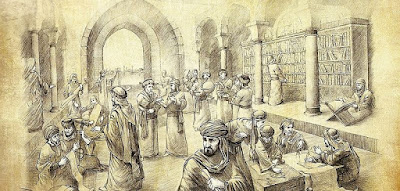This book follows Rutherfurd's traditional style, tracing one or more families through the history of a specific place, in this case Dublin. Think James Michener, if you're familiar with his writing. I personally find Rutherfurd a more readable author than Michener, but I think that's really personal opinion.
As I mentioned, this book starts out in the 400s (AD) when Dublin as a city does not exist; at this point, it's Dubh Linn, which apparently means blackpool. The book starts with an era of clan chiefs and druidism, which I personally find fascinating. I've seen other Rutherfurd fans say this is the least favorite of theirs, but I personally didn't feel that way. (Although, to be fair, I've only read his Russia book, Russka, so far.)
 The book goes on to cover the era of Saint Patrick and the Christianization of Ireland, the coming of the Vikings, and the rule of Brian Boru. It then heads into the long colonization by England with a discussion of the Strongbow era, up to the time of Henry VIII.
The book goes on to cover the era of Saint Patrick and the Christianization of Ireland, the coming of the Vikings, and the rule of Brian Boru. It then heads into the long colonization by England with a discussion of the Strongbow era, up to the time of Henry VIII.
I personally feel the book does a good job of mixing history with story. Rutherfurd allows his characters to sometimes meet and interact with historical figures, and he also manages to weave background historical information throughout the story where needed. However, the primary focus is the characters, with each chapter following a new generation of the families in his tale. He generally finds a quick subtle way to make sure you know who the current characters ancestors were in previous chapters - he often makes use of a gold-rimmed drinking skull for one family, for example. Each chapter follows the loves and struggles of the families during a set period in history, with real historical events and people for a backdrop. He does include a family tree at the beginning to assist you. In the background,we see Dublin itself evolve almost like a character in and of itself, going from the name for a particular crossing to a genuine (and important!) city through the course of the book.
I personally found all of this enjoyable, right through from the mythology of the druids and the old Irish gods, up to the struggle with the English. In a way, I found the bit about Henry VIII particularly interesting - I've read alot about the Tudor period in England, and it was interesting to look at this whole other struggle that is often a footnote in other tales of Henry. To think that he was dealing with this while also trying to get his annulment from Catherine is amazing.
(Incidentally, if you're interested in more about Henry's struggles with Catherine of Aragon, I can very happily recommend Katherine of Aragon by Alison Weir, the first in a six book series on the wives of Henry VIII. I picked it up on a sort of a whim, and it set off my interest in English history in general and the Tudors specifically.)
So, overall I definitely recommend this as a board look over the history of Ireland, and I do intend to read (and review) the second book in the duology at some point, though not right away. I also plan to seek out some fiction that looks at some of these specific periods in Irish history more closely; I've already got some by Morgan Llywelyn on my Kindle that will probably do nicely. (To digress yet again with another recommendation, if you like historical fiction about strong women, you'd love Grania, about female pirate Grace O'Malley during Elizabeth I's reign.)
While this took me a while to read, it was well worth the trip.





















